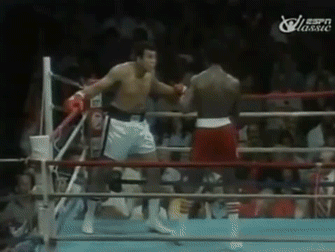 Muhammad Ali is dead. He was 74. He was the Greatest of All Time. There is a fantastic op-ed on him The New York Times.
Muhammad Ali is dead. He was 74. He was the Greatest of All Time. There is a fantastic op-ed on him The New York Times.
What casual knowledge does a random person possess, concerning Muhammad Ali?
Among all the obituaries, thinkpieces, and craggly monsters spitting hate from the cheap seats, what do we really know about Ali? We, meaning, people, off-the-cuff knowledge, removed from immediate influence -- and perhaps incorrect.
I'll start with myself. I won't say I know a lot about Ali. I bathed in Sports Illustrated for my childhood and I absorbed a decade of SportsCenter during ESPN's good years. I was told what has to be Ali's myth. To me, much of it is too unbelievable, set against a modern backdrop, especially. Nevertheless, that is as remarkable a story as what is perhaps true.
So, let's begin.
What Do Random People Know About Muhammad Ali?
All of this is from memory. That's the exercise. It's inaccuracies and exaggerations encourage the myth. I ought to read more about it and then follow back up on the topic.
My dad said of Ali, "The guy didn't go to Vietnam because he said, 'I ain't got no problem with no Viet Congs.' "
From what I can understand, Ali was a gigantic figure. He strikes me as a man who was a tremendous talent that understood who he was and what people thought of him. He was also militant in his blackness, and later in his Islamic faith, or as "militant" as a non-violent Muslim can be. It's a miracle no psychotic hate-monger ever tried to assassinate him. That all informs the story: the reverence people held toward him. He was too charismatic, too charming.
He was too American.
The footage you see of him appears super-human. His pride was Herculean. It was Achillean, more fitting for 20 BC than the 20th century. Ali possessed a black man's attitude that would have summoned the coagulated, unified shout from the dark side of the internet megaphone. (Consider the response a black cornerback like Richard Sherman received when he showed excitement after winning a football game in 2014.)
Ali was what history wanted America to be: a glory that proved to only be compatible with a very select few. Talkative, supreme, successful, happy in one's work, and racially non-specific. We all wish we were so capable, so confident, so celebrated. The eventual, smothering reality often conjurs detest for the few who manage to achieve it and live it. I count Ali among those few.
Ali dodged a billion and one punches from a fighter almost half his age because he was just that fast (see .gif at the top).
Ali won the Rumble in the Jungle, a fight in Zaire, so far removed from Las Vegas' weighted-dice paradise.
Ali invented the rope-a-dope. This tactic encouraged his opponent to swing away with gigantic punches until exhausted, while Ali waited until the fight's very end to deliver his rapid knockout.
When he was young, Ali rented a school bus with "The World's Greatest Black Fighter" painted on the side. I'm not sure of its specifics. He either parked it on his opponent's lawn or drove it around the fighter's house a few times. It was all to get into his opponent's head.
That was Ali's skill. He talked when others were focused. Ali was focused when his rivals were spending too much time thinking about him. He invented the always-on athlete persona. He was always entertaining, always drawing an audience, always attracting new fans, always attracting belief that he was the fighter the world believed in. They believed his myth. Now his opponents had to kill a myth and win a boxing match against a man as strong and quick as Ali.
Boxing is difficult enough, and "everyone's got a plan until they get punched in the mouth," according to Mike Tyson, so good luck slaying a pantheon of gods in the ring.
There are rumors Ali lived a purer lifestyle as a Muslim than the other fighters he fought. Considering the normal 1970's diet consisted of steak gristle, oiled potatoes, and a salad of cigarettes, a little guidance on what one puts in their body likely went a long way for Ali.
Ali was quotable, devout, and punishing. He went to jail for being a conscientious objector to the Vietnam war, refusing the draft. When he got out of jail, he wasn't the quick fighter he had been prior, and he had to update his style. Hours after his death, white men with government pensions held his refusal to the draft over his head. Ali did more good for the world, and for America, than the Vietnam War ever did, so I'd say Ali was in the right, and any argument otherwise is invalidated.
Ali was a ferocious self-promoter and character that a modern audience would likely doubt. He was too WWE. He too unreal. We all play characters to audiences of various sizes today on social media and in public -- can you imagine Muhammad Ali's Instagram feed (actually, please do not imagine it).
I can't quite comprehend how Ali commanded the respect that he did from the audience in the 1970's. It seems impossible from the modern perspective, taking race, religion, violence, and war into account. That is inspiring.
The stories exist. It's tragic that ancient specters frame him as a divisive figure when he is, in my estimation, precisely what his detractors pretend to mean when they describe a great American.
I want to learn more.

